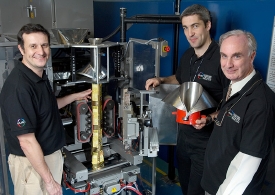Nov 21 2008
Researchers at the University of Bath and the food & drinks research centre at Campden BRI are leading a project to create a new high speed environmentally-friendly packaging process that will use recycled materials and reduce the amount of plastic used, cutting the waste that goes into landfill.

The half a million pound project is focused on improving the ‘form-fill and seal’ type of packaging used for foods such as rice, pasta and crisps. By designing a more efficient way of sealing the packaging, the researchers hope to reduce the amount of material used by 13%, which would lead to a saving of more than 39,000 tonnes per year of landfill waste.
Dr Ben Hicks, Professor Glen Mullineux, and Dr Jason Matthews from the University’s Department of Mechanical Engineering are working as part of a consortium including Campden BRI, HayssenSandiacre Europe, Amcor Flexibles Food and United Biscuits on the two-year project that is funded by the Department for Environment, Food and Rural Affairs (DEFRA).
They will examine the process used to mechanically fill and seal the packaging and then use this information to design a new packing machine that uses less plastic and can use recycled materials.
Dr Ben Hicks, Senior Research Fellow and Deputy Director of the University’s Innovative Design Manufacturing Research Centre (IdMRC), said: “Projects such as this are fundamental to the consumer goods industry if it is to meet the challenge of sustainability.
“In the area of consumer packaging, ever-tightening legislation is forcing goods manufacturers to reduce material consumption and reduce the environmental impact of their finished product.
“To meet such targets there is a need for manufacturers to maximise the efficiency of existing equipment, minimise material consumption and use thinner, lighter-weight, recyclable and recycled materials.
“The project brings together a diverse mix of industrial and academic research partners, combining both theoretical and practical studies to tackle this challenge.
“The project is building on the theoretical and modelling expertise of the University’s Department of Mechanical Engineering and using the materials and packaging testing facilities of Campden BRI to try out the new system.
“The scientific knowledge base is further enhanced by the materials processing knowledge of Amcor, the practical experience of consumer goods packaging from United Biscuits and the machinery design knowledge of HayssenSandiacre.”
In addition to reducing the amount of plastic used in the packaging, the research team are also investigating new sealing processes that can be used with the latest biodegradable materials, which will lead to further environmental benefits.